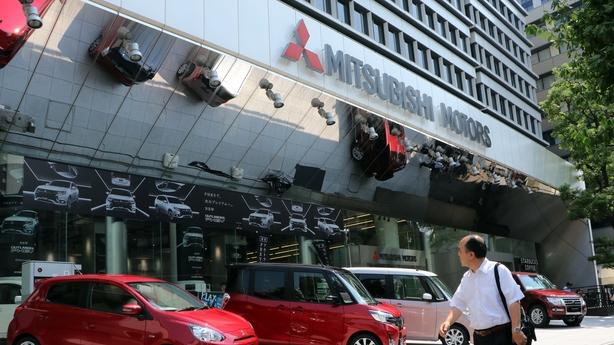Mitsubishi Motors has had its offices raided as shares plunged 20% in the wake of the Japanese carmaker's shock admission it falsified tests that measure fuel efficiency in more than 600,000 vehicles.
Japanese officials searched the company’s Okazaki manufacturing plant as Mitsubishi stock nosedived again to close at 583 yen (€4.70), losing about one-third of its value since the news broke yesterday, when the shares tumbled 15%.
Japan's transport ministry yesterday ordered the company to submit a full report on test manipulation within a week, and said it would decide on its response by 18 May.
Japan's sixth-biggest vehicle manufacturer said yesterday it had manipulated test data to overstate the fuel economy of 625,000 cars, a situation the government called "extremely serious".
Mitsubishi had said it stopped making and selling its eK mini-wagons for the domestic market after Nissan, which markets a similar model made by Mitsubishi Motors, found a discrepancy in fuel efficiency test data.
JPMorgan car analyst Akira Kishimoto estimated the cheating could cost Mitsubishi around €400m, including payments to consumers, the costs of replacing parts, and compensation to Nissan.
And while Mitsubishi said the cars were sold only in Japan, the impact could be felt wider.
"In addition to the costs of the scandal, the secondary effects on worldwide sales could be very large," Mr Kishimoto wrote in a note to clients, adding that the automaker has tied its brand to environmentally friendly technology with its fuel-sipping plug-in hybrids and fully electric vehicles.
Under Tokyo stock market rules, as no trades were made in Mitsubishi Motors' shares for all of today, they were deemed to have closed at the indicated price.
The indicated price today was 583 yen, the lowest they could go for the day, representing a 20% drop from yesterday's close.
A fall to that level takes Mitsubishi Motors' shares below the previous record low of 660 yen and would mean they have lost a third of their market value, or €2.21bn, in two days.

Revelations of the cheating follow a cover-up scandal that brought Mitsubishi close to the brink about a decade ago, when the automaker admitted to systematically concealing defects over decades.
It was Japan's worst automotive recall scandal at the time.
"This undermines consumers' trust and it shouldn't have happened. It is an extremely serious case," Chief Cabinet Secretary Yoshihide Suga, the government's top spokesman, told a news conference.
"We want the whole picture of the misconduct clarified as soon as possible, and want a strict response and the safety of automobiles to be ensured," he said.
Mitsubishi, which has annual sales of just over one million cars, is the first Japanese carmaker to report misconduct involving fuel economy tests since Volkswagen was discovered last year to have cheated diesel emissions tests in the US and elsewhere.
People briefed on the matter told Reuters Volkswagen and US officials had reached a framework deal under which the automaker would offer to buy back almost 500,000 diesel cars that used sophisticated software to evade US emission rules.
South Korean car maker Hyundai and affiliate Kia in 2014 agreed to pay €310m in penalties to the US government for overstating their vehicles' fuel economy ratings.
They also resolved claims from car owners.

